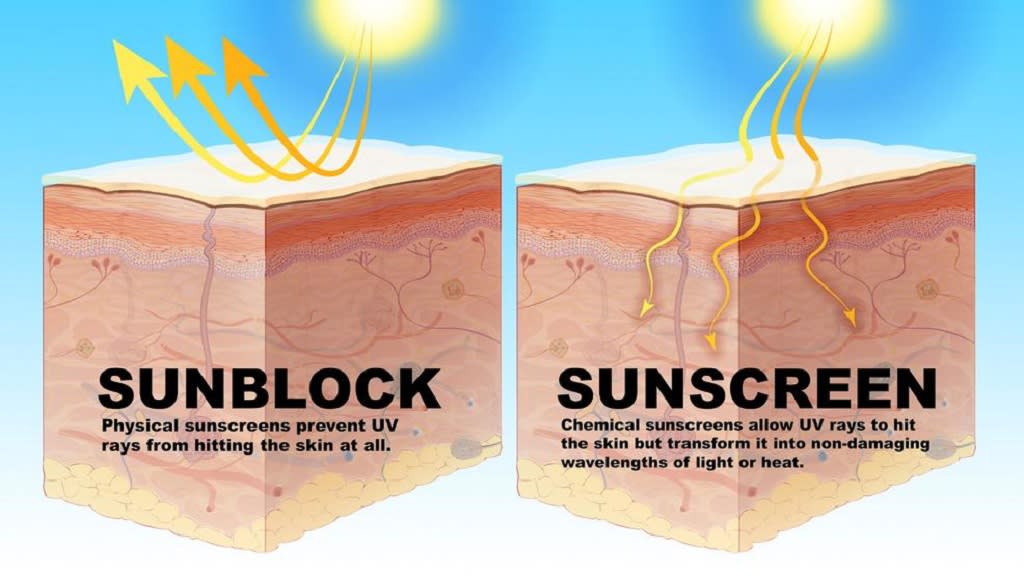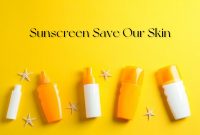SUNSCREEN VS SUNBLOCK
Sunscreen, sunblock, SPF. They’re all the same right? Wrong! Today I am dropping so cold hard facts about which ones you need to be wearing. There are so many dang sun cream options at the store and it doesn’t really matter anyway, they’re all the same right? Wrong. You’d be surprised to learn that there is, in fact, a difference between sunblock and sunscreen. And that’s why today we’re talking about what you need to know about each of them and how to figure out which kind to buy. Hey everyone, I’m Doctor Jordan Wagner. I’m an emergency room doctor who treats everything from COVID to gunshot wounds, burns, you name it. I’ve created this video series to help answer some of your medical questions and the questions that I get from patients each and every day. If you find this video helpful, please do me a favor and subscribe. Okay, you’re standing at your local drug store and see bottle A: sunscreen and a bottle B: sunblock. Which is which? And what’s the big difference? Can I just grab one and go? Well, we often hear the words sunblock and sunscreen used interchangeably. You should know that these products do in fact act in different ways. And we will get into all of that in just a sec. But for starters, you may be wondering why we even need to use a skin protector? Well, the long and short of it is: these products protect your skin from UV rays. The depletion of the ozone layer has increased our risk of sun damage from harmful UV rays. Sunscreens and sunblocks do just that combat these rays, greatly reducing the likelihood of sunburn. This includes people who tan easily, who have darker complexions, and those who don’t. Remember, your skin is damaged by sun exposure over your lifetime. By applying these protectants each day, you cut your risk of contracting skin cancers in half. Okay, I’ll stop ranting over here. back to sunscreen vs sunblock. What’s the big difference? Sunscreen is the most commonly used type of sun protectant. It filters or screens the sun’s ultraviolet rays or UV rays. It keeps most rays out but lets some in. It may also be commonly referred to as chemical sunscreen. Sunblock, on the other hand, reflects the sun’s rays from the skin, blocking the rays from penetrating the skin. It may also be called physical sunscreen. And because sunscreen and sunblock act in different ways, that means their ingredients are completely different. Or in other words, each type of sunscreen or sunblock uses different chemicals to protect the skin against the sun’s damaging UV rays. Sunblock works by sitting on top of your skin, acting as a shield from the sun thanks to it’s key ingredients zinc oxide or titanium oxide. Sunblocks are often opaque and noticeable when applied to the skin. Some individuals consider this to be a disadvantage because the consistency makes it sometimes a little difficult to spread all over the body. Most sunscreens on the other hand include key ingredients such as avobenzone, oxybenzone, and para-aminobenzoic acid that absorb the sun’s rays. I should note that if you have sensitive skin you may want to steer clear of sunscreens specifically as some individuals have reported being allergic to certain ingredients in them such as para-aminobenzoic acid. So it might be best if you have sensitive skin to opt for a sunblock specifically. What we are commonly seeing today is many brands are blending sunscreen and sunblock together. So it’s important to check the label if you have a sensitivity to certain chemicals and fragrances to know what is best for your skin. Okay, the big dramatic question. Which is the best and which one should you choose? A sunscreen or a sunblock? Well, both. Sunscreen and Sunblock provide protection from the sun. According to the Skin Cancer Foundation, however, skin type should be considered when choosing the right product for you. If you have sensitive skin, sunblocks with zinc oxide and titanium oxide are probably a better option for you. These ingredients are also typically found in products for children, who have different sun protection needs. Individuals with skin conditions, such as rosacea or allergy-prone skin, should avoid products that contain fragrances, preservatives, and oxybenzone or PABA, which are often found in sunscreens. However all that to say sunscreen and sunblock are both excellent forms of sun protection and the American Academy of Dermatology doesn’t necessarily advise using one over the other. And whether you choose one over the other, you should at least choose one of the two options. It’s important that if you’re outside you wear some form of sunscreen no matter which option it is, to protect your skin from the sun’s harmful rays. Not sure what SPF to use? Look for products that are SPF 30 or greater, have broad-spectrum protection, and are water-resistant. And as I mentioned before, make sure to avoid any products that contain ingredients your skin may be sensitive to. To prevent burning, reapply sun protectants every two hours, or every 40 to 80 minutes after being in the water or sweating. Alright, that’s been a quick sunblock vs sunscreen conversation with me, Doctor Wagner. Do you typically opt for sunblock over sunscreen or vice versa? And what SPF do you typically use? Let me know in the comments. Or if you have any other medical questions let me know those too below. And please make sure that you subscribe and turn your bell notifications on. Thank you so much for watching and stay healthy, my friends.



